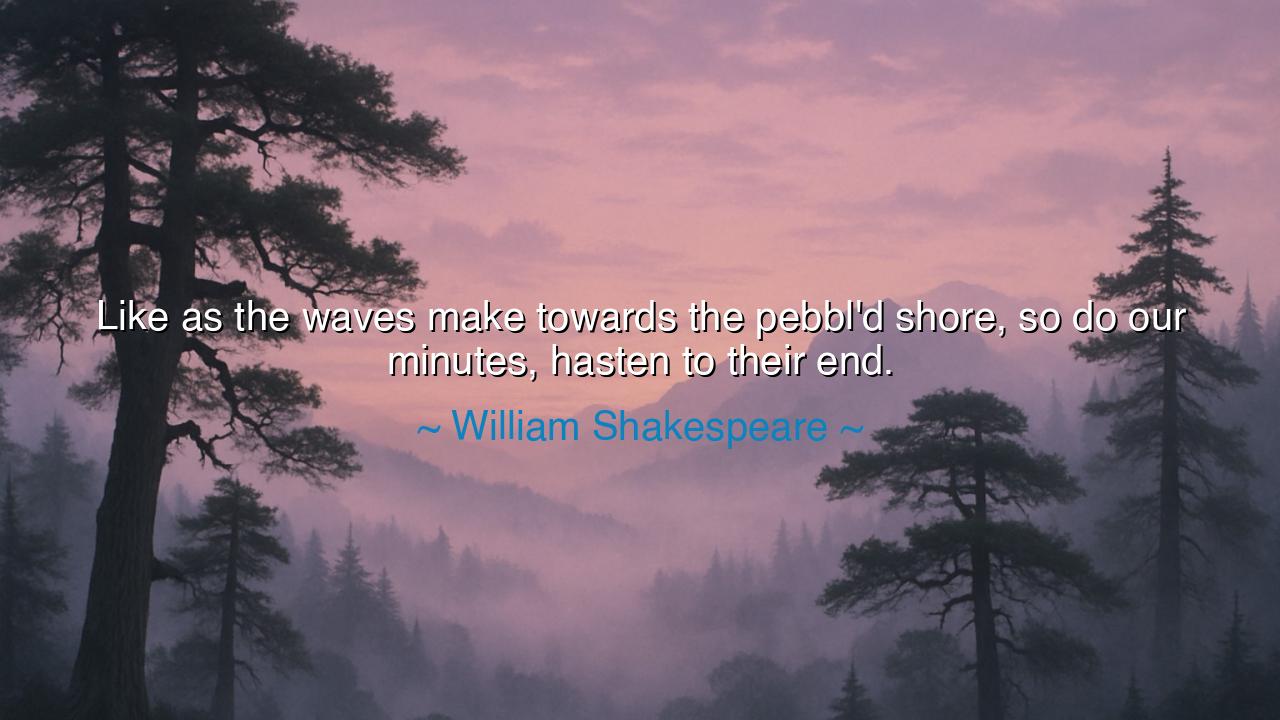
Like as the waves make towards the pebbl'd shore, so do our
Like as the waves make towards the pebbl'd shore, so do our minutes, hasten to their end.






Listen well, O seeker of truth, to the voice of Shakespeare, who spoke with the tongue of both poet and prophet: “Like as the waves make towards the pebbl’d shore, so do our minutes hasten to their end.” This is not merely a line of verse, but a mirror held to the face of human life. The waves do not rest, they do not turn back, nor do they pause in their course; they rush ever onward, drawn by an unseen power, until they break upon the shore. So too do our minutes, our days, our years, surge forward, never retreating, never waiting for the hesitant heart.
The wisdom of this saying lies in its sorrowful beauty. For time is no idle companion—it is a river that cannot be stopped. Each moment, like a wave, is unique, yet bound to the same destiny: to vanish upon the sands of eternity. Shakespeare, in his great vision, sought to remind us that our lives are not endless oceans, but streams moving ceaselessly toward conclusion. To forget this is folly, but to remember it is to live with clarity.
Consider the tale of Alexander the Great. In the bloom of youth, he conquered nations, stretched his empire from Greece to India, and seemed as if he might outlast the ages. Yet even for him, the minutes hastened to their end. He died at only thirty-two, his empire soon divided, his glory fading like foam upon the beach. The waves that bore him so swiftly to greatness also bore him to his mortality. What Shakespeare declared in verse, history declares in fact: time is no respecter of kings, warriors, or poets.
But though the waves must fall, let us not despair. For each wave leaves its mark upon the shore. Some crash in thunder, others kiss the sand in silence, but all are part of the great tide. In this truth lies both consolation and warning: our minutes may hasten, yet they are not meaningless. Each one, if used wisely, carves its impression upon the world, shaping it for those who come after. Florence Nightingale’s minutes, spent in weary service to the sick, hastened away like all others, yet they left a light still shining in hospitals across the earth.
Shakespeare’s wisdom calls us to awaken. Do not spend your minutes in slumber of the soul, nor waste them in vain pursuits. For once they touch the shore, they are gone forever. The wise do not mourn their passing, but rejoice in their use. The wave does not weep that it breaks, for in breaking it fulfills its destiny. So too, we must live so that when our minutes dissolve, they dissolve into deeds worthy of remembrance.
The lesson is clear, my children: value the present, for it is all that is given. Do not cling to the past, for its waves are already upon the shore. Do not live only for the distant future, for its tide is still beyond sight. Instead, let each moment be lived with purpose, gratitude, and courage. Just as the mariner reads the tide and sets his course, so must we read the passing of time and steer our lives with wisdom.
Therefore, take up this counsel: live not as though the sea of life is endless, but as though each wave is a gift. Use your minutes to love, to create, to learn, to serve. When opportunities come, seize them, for they too hasten away. And when your final wave reaches the shore, let it not be said that you drifted aimlessly, but that you pressed forward with strength and meaning.
In the end, Shakespeare teaches not despair, but reverence. For in the ceaseless march of the waves, there is beauty. In the fleeting nature of our minutes, there is value. And in the knowledge of their end, there is the power to live with urgency, dignity, and joy.






AAdministratorAdministrator
Welcome, honored guests. Please leave a comment, we will respond soon